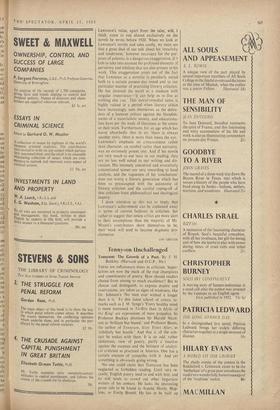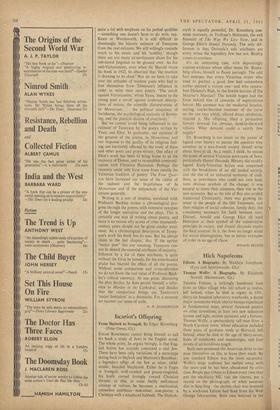Tennyson Unchallenged
THESE are inflationary times in criticism. Super- latives are now the mark of the true champions
and connoisseurs of poetry. How should readers choose from among so much excellence? But to choose and distinguish, to express doubts and reservations, are taken as signs of weakness, like Dr. Johnson's 'No man ever wished it longer than it is.' To this latest school of critics, re-
marks such as J. M. Synge's 'Every healthy mind is more interested in Tit-Bits than in Idylls of the King' are expressions of mere prejudice. So Professor Buckley dismisses Sir Harold Nicol- son as 'brilliant but biased,' and Professor Baum, the author of Tennyson, Sixty Years After, as 'scholarly but hostile.' And that is all the con- tact he makes with them. It is an odd, rather idolatrous, view of poetry, partly a reaction against the excesses and the bittiness of analyti- cal criticism as practised in America. One has a certain amount of sympathy with it. And yet something is obviously going wrong.
No one could claim that Tennyson has been neglected or forbidden reading. Until very re- cently, English poetry used to end with him, and II:. still tends to crowd out other important writers of his century. He lacks the interesting prose side to be found in Arnold, Hardy, Hop- kins, or Emily Brontë. He has to be built up
quite a lot with emphasis on his period qualities —something one doesn't have to do with, say, Keats or Wordsworth. It is still difficult to disentangle the historic estimate of Tennyson from the real estimate. We still willingly concede much to his music and his 'nobility,' though there are too many ex-servicemen about for his sub-moral jingoism to be glossed over. As for anti-Victorianism, even when Sir Harold wrote his book in 1923, he observed that `the reaction i5 drawing to its close.' Nor do we have to take over the attitudes of modern poets who had to free themselves from Tennyson's influence in order to write their own poetry. 'The revolt against Victorianism,' wrote Yeats, `meant to the young poet a revolt against irrelevant descrip- tions of nature, the scientific discursiveness of In Memoriam . . . the political eloquence of Swinburne, the psychological curiosity of Brown- ing, and the poetial diction of everybody.'
But we cannot avoid being influenced in our estimate of Tennyson by the poetry written, by
Yeats and Eliot. In particular, our estimate of the greatest of the poems, in Memoriam, and our response to the quality of its religious feel- ing, are inevitably affected by the work of these and other poets and prose-writers. One effect of Eliot's work has been to bring home to us the recovery of Donne, and to re-establish communi- cation with Christian Platonism. Perhaps this recovery could only have conic from outside the Victorian tradition of poetry. The Four Quar- tets have increased our sense of the oddity of the sadness and the hopefulness of In Memoriam and of the melancholy of the Vic- torians generally.
Writing in a sort of timeless, unrelated void, Professor Buckley makes a chronological pro- gress through the poems, with extensive synopses of the longer narratives and the plays. This is certainly one way of writing about poetry, and there is no reason why scores of other nineteenth- century poets should not be given similar treat- ment. As a chronological description of Tenny- son's work his book has its uses. But his abrupt claim in the last chapter, that 'if the epithet "major poet" has any meaning, Tennyson can- not be denied the essential attributes of majority,' followed by a list of these ant ibutes, is quite without the force he intends, for his even-handed praise has blurred the effect of all the poems.
Without some comparison and cross-reference we do not know the real value of Professor Buck- ley's critical currency. At one point, discussing the play Becket, he does permit himself a refer- ence to Murder in the Cathedral, and decides that the comparison brings out Tennyson's `major limitation' as a dramatist. For a moment we recover our sense of scale.
G. D. KL.INGDPULOS















































 Previous page
Previous page